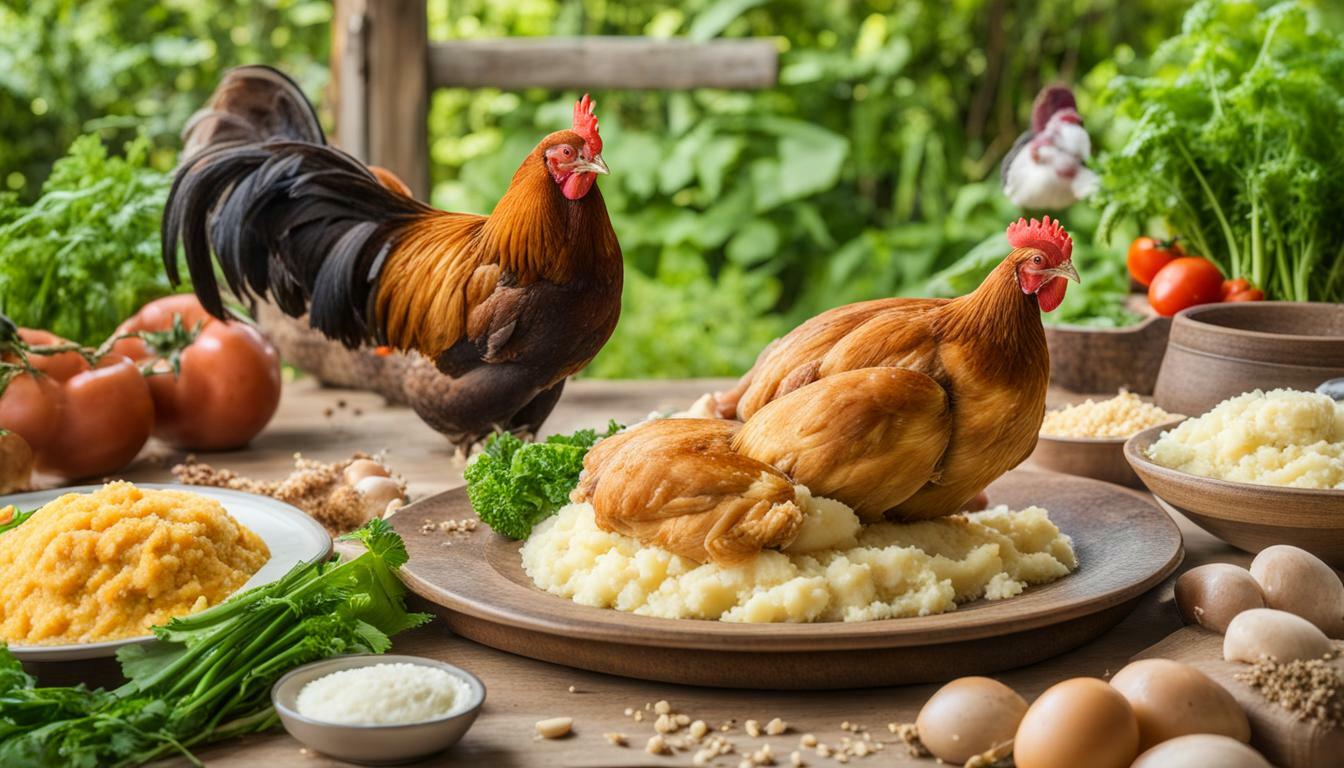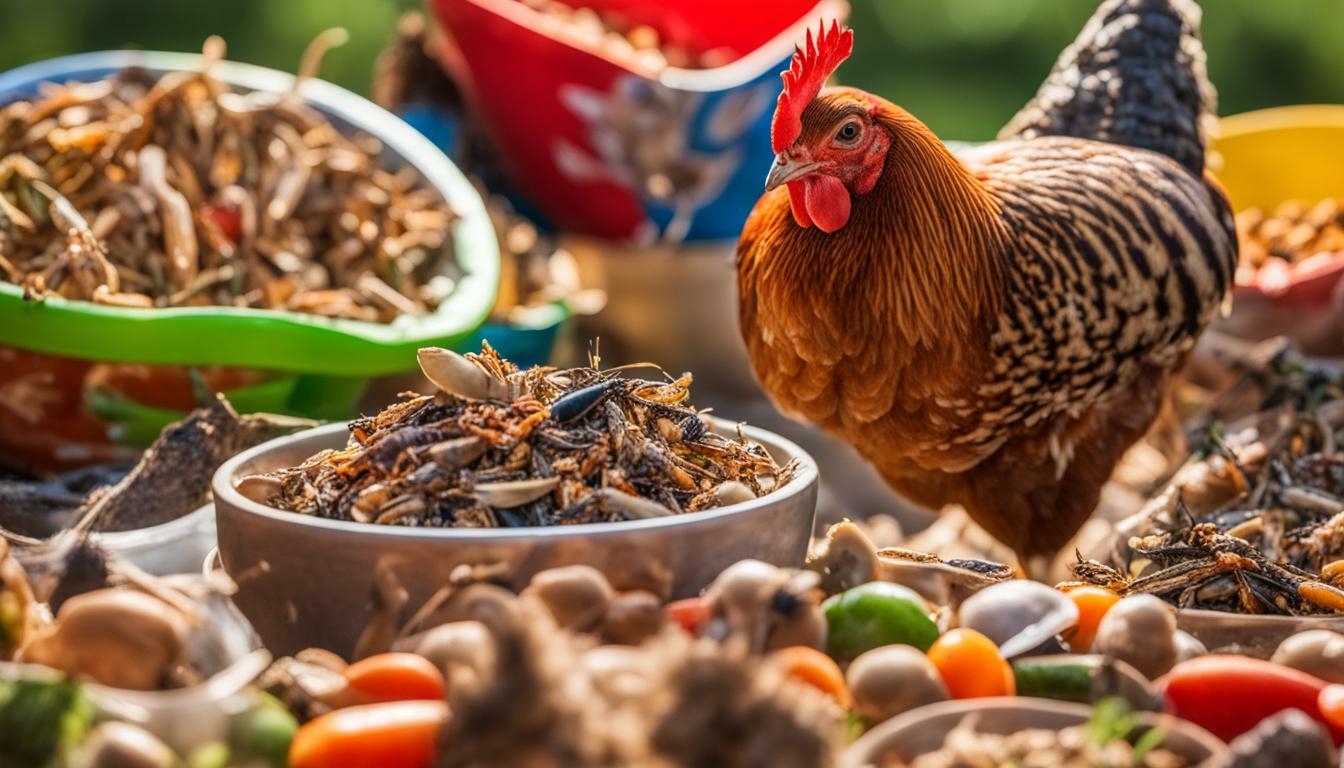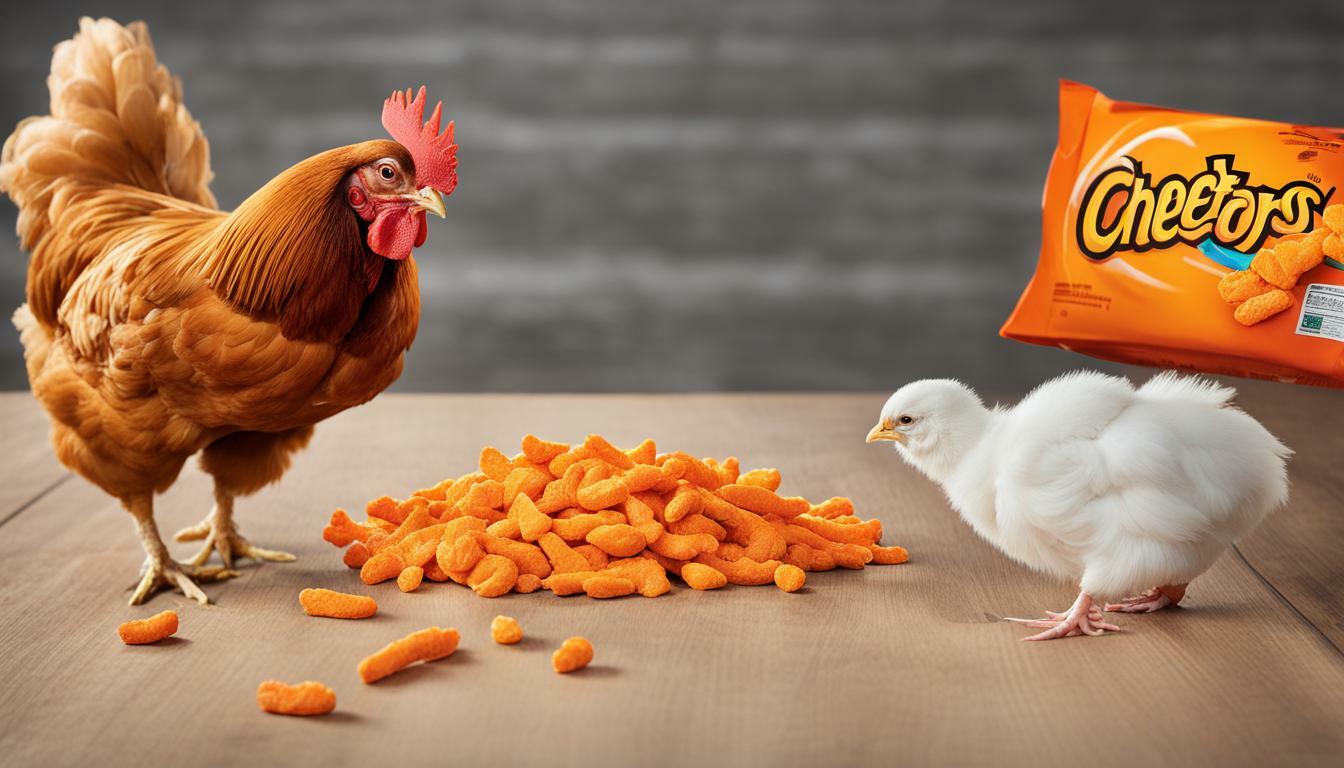Can Chickens Eat Mashed Potatoes? Your Friendly Guide

Table of content:
- A Healthy Treat for Chickens
- Potential Concerns of Feeding Chickens Potatoes
- Feeding Recommendations for Chickens
- Are Leftover Mashed Potatoes Safe for Chickens?
- Can Chickens Eat Instant Mashed Potatoes?
- What is the Ideal Amount of Mashed Potatoes for Chickens?
- Do Chickens Like the Taste of Mashed Potatoes?
- Are Potatoes Good For Chickens?
- Potential Health Issues in Chickens from Eating Potatoes
- Final Thoughts
Chickens can absolutely eat mashed potatoes in moderation as part of a balanced diet. Mashed potatoes offer some nutritional benefits for chickens but also need to be fed carefully to avoid potential health issues.
A Healthy Treat for Chickens
Mashed potatoes can be a nutritious occasional treat for chickens. Here are some of the benefits:
- Starch – Potatoes provide a good source of energy from their starch content. This gives chickens a carbohydrate boost.
- Vitamins – Potatoes contain Vitamin C and B vitamins like niacin, riboflavin, and thiamin. This helps chickens get important nutrients.
- Minerals – Potatoes provide minerals like iron, potassium, and phosphorus which are useful for chickens.
- Water content – The moisture in mashed potatoes can help hydrate chickens.
So in moderation, mashed potatoes can be a healthy supplemental feed for chickens, providing energy, vitamins, and minerals.
Potential Concerns of Feeding Chickens Potatoes
While potatoes can be beneficial, there are some potential downsides to be aware of when feeding chickens mashed potatoes:
- Solanine – Potatoes contain a toxin called solanine that can be harmful in very large quantities. Feeding chickens too many potatoes could cause solanine poisoning.
- Fat content – Mashed potatoes are often prepared with butter, milk, and other high-fat ingredients. Excessive fat can lead to obesity and other health issues in chickens.
- Lack of protein – Potatoes by themselves have very little protein, which chickens need to thrive. Relying solely on potatoes could lead to protein deficiency.
- Spoiled potatoes – Moldy, rotten, or green potatoes can contain much higher concentrations of solanine and are not safe for chicken consumption. Only feed chickens fresh mashed potatoes.
So it’s important to feed mashed potatoes in moderation as an occasional treat, not as a primary component of a chicken’s diet.
Feeding Recommendations for Chickens
When feeding mashed potatoes to chickens, follow these tips:
Only Provide Mashed Potatoes Occasionally
Mashed potatoes should not be a regular part of a chicken’s diet, but rather an occasional supplemental treat a couple of times a week at most.
Skip High Fat Ingredients
Avoid using mashed potatoes prepared with butter, cream, or other high-fat ingredients, as excess fat is unhealthy for chickens. Instead, stick to plain mashed potatoes with minimal dairy.
Mix With Other Healthy Ingredients
Combine mashed potatoes with healthy foods like chopped greens, vegetable scraps, or a small amount of shredded chicken. This increases the nutritional value.
Avoid Moldy or Rotten Potatoes
Never feed chickens mashed potatoes that are moldy, rotten, or contain green potato skins, as these can harbor dangerous levels of toxins. Only use fresh potatoes.
Feed Alongside Primary Feed
Always provide abundant access to regular complete chicken feed in addition to mashed potatoes to ensure chickens get balanced nutrition.
Start with Small Amounts
Initially only feed chickens a tablespoon or two of mashed potatoes at a time to gauge their reaction and make sure they tolerate it well.
Adjust Quantities for Chicken Size
The amount of mashed potatoes chickens can eat depends on their size and weight. Start with small amounts and adjust up for larger breeds.
By following these tips, mashed potatoes can be provided as an occasional treat without risking the health of chickens. Monitor them to ensure no issues arise.
Are Leftover Mashed Potatoes Safe for Chickens?
Leftover mashed potatoes from human meals can also be fed to chickens in moderation, though care should be taken. Here are some tips:
- Inspect leftovers thoroughly and discard any with mold, funny smells, or that seem rotten.
- Refrigerate leftovers properly. Only feed chickens mashed potatoes stored safely at 40°F or below. Discard any left out too long at room temperature.
- Remove excess gravy, butter, or salt from leftovers before feeding to chickens. These seasonings can be unhealthy.
- Start with small amounts of leftovers at first to see if the chickens tolerate it well.
- Never re-feed chickens anything they did not eat the first time.
Following these precautions, leftover mashed potatoes are usually fine for chickens as an occasional treat. But leftovers should not become a primary food source.
Can Chickens Eat Instant Mashed Potatoes?
Instant mashed potatoes made from dehydrated potato flakes or granules can also be fed to chickens safely, though they may have less nutrition. Here are some tips:
- Choose plain instant mashed potatoes, not flavored ones which can contain excess sugars, salt, and preservatives.
- Prepare the instant potatoes with water according to package directions, not milk or butter.
- Cut the amount of instant potatoes to feed chickens by half compared to the serving size for humans. Chickens need smaller portions.
- Mix in extra vegetables, greens, or shredded chicken to add nutrients missing from instant potatoes alone.
- As always, feed instant mashed potatoes in moderation alongside the chicken’s regular feed.
With these precautions, instant mashed potatoes can provide chickens with added carbohydrates and nutrients. But scratch grains or fresh veggies are healthier options overall.
What is the Ideal Amount of Mashed Potatoes for Chickens?
There is no established perfect quantity of mashed potatoes to feed chickens. The amount depends on factors like:
- The size of the chicken – Smaller breeds can eat less than larger breeds.
- Other components of their diet – More mashed potatoes may be okay if the chicken has a diverse diet otherwise.
- Energy needs – More active chickens like layers may benefit from more carbohydrates.
- Environmental temperatures – Chickens in cold climates may need more calories during winter.
As a general guideline, a serving size of 1-4 tablespoons of mashed potatoes 1-2 times per week is a safe amount for most adult chickens. Adjust this as needed based on your individual flock.
For chicks younger than 16 weeks old, start with just 1-2 teaspoons of mashed potatoes at a time until they are mature. Overfeeding younger chicks can lead to developmental issues.
Monitor your chickens’ droppings and behavior after introducing mashed potatoes. Diarrhea or lethargy may be signs you need to reduce the amounts.
Do Chickens Like the Taste of Mashed Potatoes?
Most chickens find mashed potatoes to be a tasty treat thanks to their starch, fat, and salt content. The texture of smooth, soft mashed potatoes is also attractive to chickens.
To increase the appeal, you can mix in small amounts of:
- Cooked egg yolks
- Chicken broth or drippings
- Chopped greens like kale or spinach
- Diced carrots or squash
- Cottage cheese
- Oatmeal
Just be sure any additions are safe for chickens to eat and introduced slowly in small quantities.
Observe your flock after offering mashed potatoes. If they eagerly consume the potatoes, they likely enjoy the taste. But if they ignore the potatoes, they may not like them.
Are Potatoes Good For Chickens?
Overall potatoes do have nutritional value for chickens and most enjoy the taste. However, there are healthier options to feed chickens like:
- Fresh fruits and vegetables – Higher in vitamins, minerals and fiber
- Leafy greens – More nutrients and moisture
- Chicken scratch – Grains provide balanced nutrition
- Mealworms or bugs – Natural source of protein
- Layer feed – Formulated for a complete diet
So while potatoes can supplement a chicken’s diet, they shouldn’t be a dietary staple. Prioritize more nutrient-dense foods before potatoes.
Potential Health Issues in Chickens from Eating Potatoes
In rare cases, eating potatoes could cause health problems for chickens. Here are some potential risks to watch out for:
Diarrhea – Too much starch and sugar in potatoes could lead to loose droppings if a chicken eats a lot.
Obesity – Excess calories from potatoes may lead to overweight chickens.
Fatty liver disease – High fat content in improperly prepared mashed potatoes risks liver problems.
Bacterial infections – Spoiled potato dishes can harbor Salmonella, E. coli, or other bacteria.
Intestinal blockages – Raw potato peels may obstruct a chicken’s digestive tract if eaten.
Solanine poisoning – Green or rotten potatoes with high glycoalkaloid levels can be toxic.
Luckily these issues are avoidable by feeding potatoes properly. But monitor for any concerning symptoms in chickens after eating potatoes just to be safe.
Final Thoughts
Mashed potatoes can be a safe, healthy supplemental feed for chickens when fed properly in moderation. Focus on providing fresh plain mashed potatoes free of excess fat, salt, and seasonings. Mix with additional nutrients like veggies or whole grains. Limit potatoes to an occasional treat for variety, not a daily staple. Follow proper food safety when re-feeding leftovers. By being mindful of nutrition, variety, and food safety, chicken keepers can allow their flock to benefit from mashed potatoes as part of a diverse diet. But potatoes should never completely replace a complete feed or natural food source. Monitoring the health of chickens after introducing any new food is key to keeping chickens healthy and productive.
Welcome. I’m Adreena Shanum, the proud owner of this website, and I am incredibly passionate about animals, especially poultry. I founded adreenapets.com as a labor of love, stemming from my desire to share my knowledge and experiences with poultry enthusiasts worldwide.




